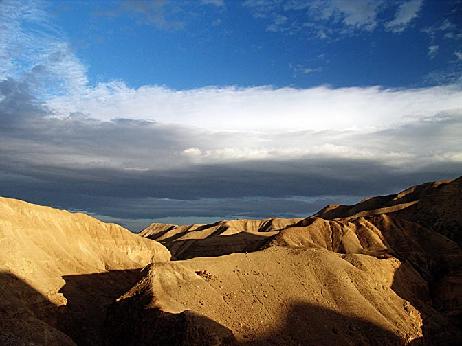Advent II A Way in the Wilderness
O God, you are my God; eagerly I seek you;
my soul thirsts for you,my flesh faints for you,
as in a barren and dry land where there is no water.
Psalm 63:1
The desert wilderness is both a primary and recurring landscape of the soul. A place of danger and unspeakable beauty; of demons, wild beasts, roaming spirits, and temptation, the desert also hosts ministering angels and offers an unhindered sphere for the encounter with God.
The desert evokes the love story of God and Israel. In the wilderness, the Hebrews came to know Yahweh after centuries of slavery in Egypt. Here, Elijah took refuge, David hid from his enemies, Jesus came to be tested.
In more prosperous times, the idea of the desert offered nostalgia. Israel forgets the bitterness of her forty year sojourn but remembers that manna tasted like honey. God forgets the golden calf and proposes to lure Israel back for a second honeymoon. Likewise, the soul forgets the privations and terror of that first plane of disorientation and only remembers opening to the Other.
The soul returns to the desert for wild beauty and wonder, perspective and unbearable intimacy. In this liminal refuge the soul comes for renewal of the sense of longing essential to mystical life. You come to this ambiguous sanctuary to lose self-consciousness, and to gaze at ultimate Consciousness.
Unless you find yourself in the desert unexpectedly by sheer grace, do not go unprepared. The caravans turn aside from their course; they go up into the waste, and perish. Job 6:18
|
The Figure of John the Baptist
As it is written in Isaiah the prophet, “Behold, I send my messenger before my face, who shall prepare thy way; the voice of one crying in the wilderness: Prepare the way of the Lord, make his paths straight.” John the baptizer appeared in the wilderness, preaching a baptism of repentance for the forgiveness of sins. … Now John was clothed with camel’s hair, and had a leather girdle around his waste, and ate locusts and wild honey. Mark 1:2-3,6
In mid-Advent the church gives us John the Baptist as forerunner to the Christ, spiritual guide, and as a guardian of the threshold. “With the personifications of his destiny to guide and aid him, the hero goes forward in his adventure until he comes to the “threshold guardian” at the entrance to the zone of magnified power.” Joseph Campbell p. 64 The Hero with a Thousand Faces
John dwells in the desert completely dependant upon what God provides for him: locusts and wild honey. John the Baptist shows us how to find our way in the wilderness. Preaching conversion and repentance, John draws us into the purgative way of prayer: “To be a spectator of Reality is not enough. The awakened subject is not merely to perceive transcendent life, but to participate therein; and for this, a drastic and costly life-changing is required.” Underhill, p.195
Our brokenness is the wound
through which the full power of God
can penetrate our being and transfigure us in God.
Loneliness is not something from which we must flee
but the place from where we can cry out to God,
where God will find us and we can find God.
Yes, through our wounds the power of God can penetrate us
and become like rivers of living water to irrigate the arid earth within us.
Thus we may irrigate the arid earth of others,
so that hope and love are reborn.
- Jean Vanier, The Broken Body (1988,Paulist Press)
|
 |
| Judean Desert, photo courtesy of Efrat Nakash, http://www.EfratNakash.com |
|
|
Quotes from Mysticism by Evelyn Underhill
(from Chapter II, The Awakening of the Self)
First in the sequence of the mystic states, we must consider that decisive event, the awakening of the transcendental consciousness. This awakening, from the psychological point of view, appears to be an intense form of the phenomenon of “conversion”; and closely akin to those deep and permanent conversions of the adult type which some religious psychologists call “sanctification.” p.176
Sometimes the emergence of the mystical consciousness is gradual, unmarked by any definite crisis. The self slides gently, almost imperceptibly, from the old universe to the new. The records of mysticism, however, suggest that this is exceptional: that travail is the normal accompaniment of birth. p. 177
We have said that this consciousness in its full development seems to be extended not in one but in two directions. These may be called the eternal and temporal, transcendent and immanent, absolute and dynamic aspects of Truth. They comprise the twofold knowledge of a God Who is both Being and Becoming, near and far: pairs of opposites which the developed mystical experience will carry up into a higher synthesis. p.195
So, even in its very beginning, we see how active, how profoundly organic, how deeply and widely alive is the true contemplative life; how truly on the transcendent as on the phenomenal plane, the law of living things is action and reaction, force and energy. The awakening of the self is to a new and more active plane of being, new and more personal relations with Reality; hence to a new and more real work which it must do. p.197
|
Collect for the Second Sunday of Advent
Merciful God,
who sent your messengers the prophets
to preach repentance
and prepare the way
for our salvation:
Give us grace to heed their warnings
and forsake our sins,
that we may greet with joy
the coming of Jesus Christ our Redeemer;
who lives and reigns with you and the Holy Spirit,
one God, now and for ever. Amen.
|
|